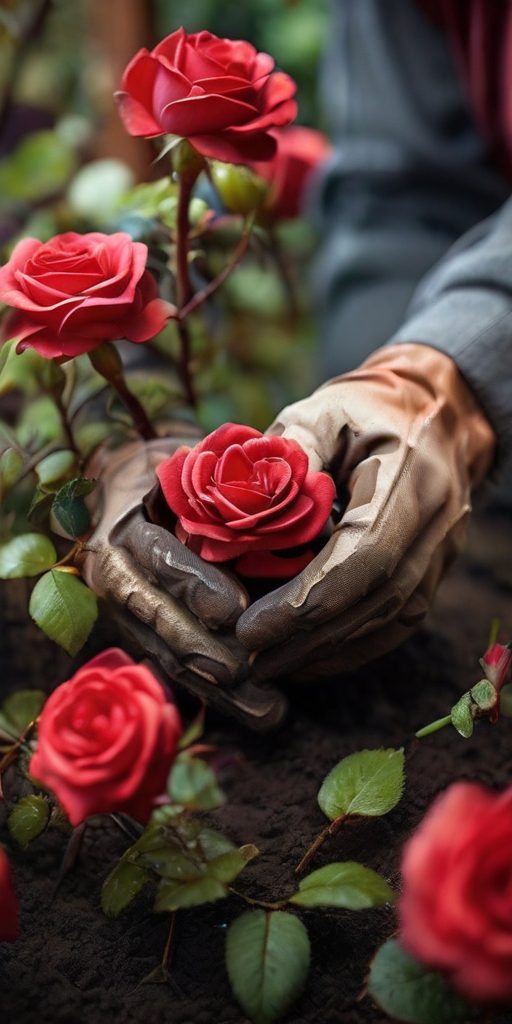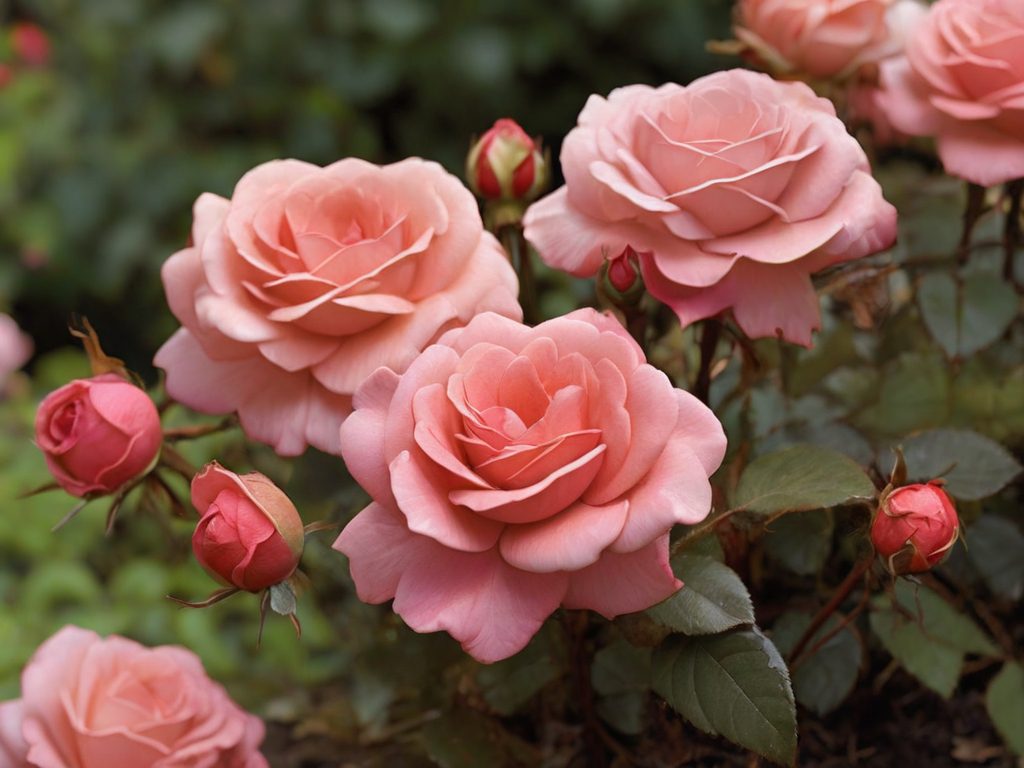Well, hello there fellow rose enthusiast! I bet you’re wondering about the best time to feed those beauties, aren’t you? You’ve landed at the right place! Let’s dive into the world of ‘When to Fertilize Roses’. Trust me, it’s not as thorny as it sounds.
In this guide, we’ll be demystifying rose fertilization – from timing and techniques to all the nitty-gritty details in between. So buckle up and get ready for a blooming good read. Keep reading about When to Fertilize Roses: Your Guide to Rose Fertilization Timing and Techniques.
Key Takeaways
- Fertilizing roses is not a one-size-fits-all process. The timing, quantity, and type of fertilizer used can vary based on soil conditions, rose variety, and the plant’s age.
- Understanding fertilizers is crucial for effective rose care. Knowing what N-P-K values mean and how they affect plant growth can help you choose the right product for your roses.
- Choosing the right fertilizer for your roses is not just about picking any high-quality product off the shelf. Factors like soil pH, nutrient deficiencies, and rose type play a significant role in this decision.
- First-year fertilization practices differ based on soil conditions. In good soil conditions, fertilizing may be unnecessary or minimal; however, in poor soil conditions, more frequent and careful fertilization may be required.
- Regular rose fertilization in subsequent years helps maintain healthy growth but it’s important to avoid over-fertilization which can lead to nutrient burn or disease susceptibility.
- Being able to identify when your roses need fertilization is a critical skill every gardener should master. Signs like yellowing leaves or stunted growth may indicate a need for additional nutrients.
- It’s important to distinguish between pest infestations and soil issues, as misdiagnosis could lead to improper treatment that might further harm your roses.

To Fertilize or Not to Fertilize
Ah, the age-old gardener’s quandary: to fertilize or not to fertilize. Especially when it comes to our beloved roses, getting the rose fertilization timing just right can feel a bit like trying to solve a Rubik’s cube blindfolded. But fear not! Understanding whether your roses are craving a nutrient boost or begging you to hold off on the fertilizer feast isn’t as complicated as it might seem.
First things first, let’s talk about those tell-tale signs of nutrient deficiency in roses. If your roses are looking more ‘Sleeping Beauty‘ than ‘Belle of the Ball‘, with lackluster blooms and leaves that seem to be throwing their own pity party, it might be time to whip out the fertilizer. However, this is also where knowing your optimal growth stages for roses comes in handy. Young plants and those about to bloom are usually most grateful for a bit of nutritional pampering.
But hold your horses before you start pouring that plant food like there’s no tomorrow. The dangers of over-fertilizing can turn your rose garden into a cautionary tale faster than you can say “Jack Robinson”. Burnt leaves and stunted growth are just the tip of the iceberg here.
Choosing between organic vs chemical fertilizers for roses also plays a big part in keeping your soil health in check while considering environmental considerations in rose care. And don’t forget about those pesky stress factors affecting rose health, like extreme weather conditions or disease outbreaks, which might mean it’s better to skip the fertilization round altogether.
Understanding Fertilizer and Its Role in Plant Growth
So, what’s the big deal with fertilizer anyway? Imagine trying to whip up a gourmet meal but all you’ve got in the pantry is some stale crackers and half a jar of pickles. Not gonna happen, right?
That’s pretty much how your roses feel when they’re expected to bloom and thrive without the right nutrient uptake in plants. Fertilizer is like the five-star buffet for your roses, packed with all the goodies they need to grow strong and put on a show-stopping performance.
Now, when we talk fertilizers, it’s not a one-size-fits-all situation. You’ve got your organic vs. chemical fertilizers duking it out in the garden world. Organic fertilizers are like that home-cooked meal made with love – slow-releasing, improving soil fertility for roses, and supporting overall plant nutrition without the harsh chemicals. On the flip side, chemical fertilizers are like fast food – quick results, but maybe not so great for long-term health.
The secret sauce in both types of fertilizer is the N-P-K ratio – that’s nitrogen (N), phosphorus (P), and potassium (K) to us gardening mortals. Nitrogen gives your roses the energy to grow lush and leafy, phosphorus strengthens their roots and boosts flower production, while potassium keeps them healthy and better able to fend off diseases.
Timely application of these nutrient-packed wonders can seriously amp up your rose game. We’re talking improved bloom enhancement, stronger disease resistance in roses, and an overall boost in improving plant vigor. So marking your calendar for when to fertilize roses isn’t just about keeping them fed; it’s about setting the stage for them to flourish season after season.



Choosing the Right Fertilizer for Your Roses


Picking the right rose fertilizer types isn’t just about keeping your garden looking pretty; it’s about ensuring your roses get the best possible care to bloom spectacularly and stay healthy. Whether you’re a seasoned gardener or someone who just loves to dabble in dirt now and then, understanding the difference between organic rose feed and synthetic rose nutrients, along with their benefits, can make all the difference.
First off, let’s talk nutrients. Roses are like the divas of the garden world; they need a balanced diet to show off their best performance. Essential nutrients include Nitrogen (for lush leaf growth), Phosphorus (to encourage strong roots and vibrant blooms), and Potassium (for overall health). The magic NPK ratio for roses usually leans towards a higher Phosphorus content to promote better flowering.
When it comes down to choosing between organic or synthetic options, consider this: organic feeds, like homemade compost for roses or fish emulsion, not only provide these vital nutrients but also improve soil structure over time. On the flip side, synthetic fertilizers offer a quick nutrient fix with specific NPK ratios but can sometimes lead to salt build-up in soil if not used cautiously.
For those leaning towards natural solutions, incorporating soil amendments for roses such as bone meal or well-rotted manure can be a game-changer. And if you’re eyeing those slow-release fertilizers for roses on your next garden center trip, remember they’re great for reducing application frequency while ensuring your roses don’t go hungry.
Before you make a beeline to buy what seems like the best fertilizer for flowering roses, take a moment to read those labels! Understanding what’s in that bag helps tailor your choice to your garden’s specific needs – whether it’s adjusting soil pH with amendments or picking a fertilizer with just the right nutrient mix.
And hey, while we’re at it, let’s not forget that knowing when to fertilize roses is as crucial as choosing the right feed. But more on that later – for now, let’s focus on giving our rose buddies what they need to thrive.
Optimal Times to Fertilize Roses
Knowing when to fertilize roses is like hitting the jackpot for your garden’s blooming beauties. It’s all about timing, folks!
| Fertilization Period | Soil Condition (Good/Poor) | Recommended Fertilizer Type | Application Frequency |
|---|---|---|---|
| Early Spring (after pruning) | Good | Balanced, slow-release fertilizer | Once at the start of the season |
| Early Spring (after pruning) | Poor | High-nitrogen, water-soluble fertilizer | Every 2-4 weeks until mid-July |
| Late Spring to Early Summer | Good | Balanced, slow-release fertilizer | Once, 4-6 weeks after first application |
| Late Spring to Early Summer | Poor | Balanced, water-soluble fertilizer | Every 2-4 weeks until mid-July |
| Summer (if needed for reblooming varieties) | Good | Low-nitrogen, slow-release fertilizer | Once in early summer |
| Summer (if needed for reblooming varieties) | Poor | Balanced, water-soluble fertilizer | Every 4 weeks until late summer |
| Fall (6 weeks before first frost) | Good | Potassium-rich, slow-release fertilizer | Once in early fall |
| Fall (6 weeks before first frost) | Poor | Potassium-rich, water-soluble fertilizer | Once in early fall |
Note: Avoid fertilizing roses late in the season as it can stimulate new growth that might be damaged by early frosts.
First Year Fertilization: Good Soil Conditions
When you’ve struck gold with good soil, fertilizing new roses requires a gentle hand. Over-enthusiasm with the fertilizer can backfire, so take it easy. The aim here is to support, not overwhelm, your budding friends. A balanced initial rose feeding guide suggests a light application after planting and another dose just before the bloom season kicks in. Remember, maintaining soil health for roses is a marathon, not a sprint.
First Year Fertilization: Poor Soil Conditions
Now, if your garden’s more “fixer-upper” than “ready-to-go,” don’t fret! Amending poor soil for roses isn’t rocket science but does need some elbow grease. Start by enriching that tired earth with organic matter—compost is your best friend here. Then introduce nutrients slowly; think of it as gradually building up poor garden soil for roses without overwhelming them. This gradual fertilization technique for young roses sets the stage for future flourishing.
Subsequent Years: Regular Rose Fertilization
After the rookie year comes the annual rose feeding schedule—a crucial part of keeping those blooms coming back with gusto. As your roses grow up and go through different life stages, adjusting rose fertilizer types becomes key. Spring calls for a boost to kick off growth, while late summer needs a lighter touch to prepare plants for winter without encouraging too much late growth. It’s all about reading the room—or in this case, the bush—and tweaking that seasonal fertilization for established roses accordingly.
Identifying When Your Roses Need Fertilization
Getting the timing right for when to fertilize roses isn’t just about sticking to a calendar schedule; it’s also about keeping an eye out for the tell-tale signs that your rose buddies are hankering for a bit more nutrition. Just like us after skipping breakfast, roses can get a bit grumpy and show it in various ways. Recognizing these signs early can make all the difference in maintaining vibrant, healthy roses.
- Yellowing rose leaves: This classic sign of nutrient deficiency shouldn’t be ignored. It’s like your roses are waving a little yellow flag saying, “Help, please!”
- Stunted growth in roses: If your roses aren’t reaching their full potential or seem to have hit a growth plateau, they might be telling you they’re hungry.
- Flowering frequency: Notice a drop in how often your roses bloom? This could be their way of asking for a nutritional boost.
- Signs of underfed roses include not just visual cues but also the feel of the soil. If it’s been awhile since you’ve fed them, and the soil feels lacking, it might be time.
Understanding these signs and acting promptly ensures your rose plant care routine is top-notch. Whether opting for organic vs chemical fertilizers or tweaking your seasonal feeding schedule for roses based on soil testing for roses results, recognizing when it’s prime time for optimal fertilization timing is key. After all, no one likes being hangry – not even our rose friends – and addressing nutrient deficiencies in roses before they turn into bigger issues keeps your garden looking its best.
Distinguishing Between Pest Infestations and Soil Issues
Before we dive into the nitty-gritty of when to fertilize roses, it’s crucial to understand that not all problems with your roses are due to a lack of nutrients. Sometimes, the issues stem from pest infestations or soil troubles, and boy, do they require different battle strategies! Knowing whether you’re dealing with creepy crawlies or dirt dilemmas is key because you don’t want to be fighting the wrong enemy.
When it comes to rose pest symptoms, look out for uninvited guests like aphids, spider mites, and Japanese beetles throwing a party on your plants. Signs include visible insects (obviously), irregular holes in leaves, or even sticky residue. These are your red flags that pests have gatecrashed.
- Aphids
- Spider mites
- Japanese beetles
On the flip side, soil nutrient deficiency roses show their distress differently. Yellowing leaves causes could point towards a nutrient deficiency or signs of overwatered roses. Stunted growth? The soil might just be the culprit here.
- Nutrient deficiencies
- Overwatering
Once you’ve played detective and pinpointed the issue, it’s time for action. If pests are your problem, exploring organic pest control roses methods or whipping up some natural remedies for rose pests could save the day. For soil woes, consider improving rose soil quality by adding compost or adjusting watering habits.
Remember, correctly identifying whether you’re dealing with common rose pests identification or a case of bad dirt is crucial before reaching for that fertilizer bag. This way, you ensure your rosy friends get exactly what they need without any unnecessary fuss.
Common Questions About Rose Fertilization
When it comes to keeping your roses blooming beautifully, knowing the ins and outs of rose fertilizer schedule and best fertilizer for roses can feel a bit like decoding a secret garden language. But fear not! Let’s tackle some common queries with easy-to-digest answers.
First off, how often should you be feeding these beauties? The frequency of fertilizing roses generally depends on the product you’re using and the growth stage of your plant. A good rule of thumb is to fertilize every four to six weeks during the growing season. However, if you’re into organic rose feeding, you might find that these options can be applied more liberally due to their gentle nature.
But what about the nutrient requirements for roses? Roses are pretty hungry plants, craving a balanced diet that includes nitrogen, phosphorus, and potassium. Plus, they appreciate a sprinkle of micronutrients like magnesium and iron. Ensuring your soil is well-prepped by preparing soil for rose planting with the right pH level for rose soil (slightly acidic to neutral) sets the stage for success.
And if you’ve gone a tad overboard? The signs of over-fertilized roses include yellowing leaves and weak stems. If you spot these symptoms, ease up on feeding and give your plants plenty of water to help flush out excess nutrients.
For those who love a DIY approach, whipping up some homemade rose fertilizers can be both fun and effective. Think banana peels for potassium or eggshells for calcium – your garden could turn into a mini recycling hub!
Lastly, don’t forget about seasonal tweaks in your care routine. Incorporating some savvy seasonal rose care tips, such as reducing fertilization as summer winds down, will keep your roses thriving year-round.


Conclusion
Alright, let’s wrap this up with a little bow on top. We’ve journeyed through the when to fertilize roses garden path, uncovering the secrets of timing and techniques that’ll make your roses the envy of the neighborhood. Remember, it’s not just about slapping some food on them and calling it a day. Understanding your rose variety, local climate, and soil health is like getting to know a new friend – crucial for thriving relationships.
Embrace a holistic approach to rose care tips, integrating optimal blooming techniques with regular garden maintenance. It’s all about balance – from seasonal fertilization guide to mastering effective rose feeding practices, every step you take brings you closer to those magazine-cover blooms.
And hey, don’t forget about the synergy between pruning and fertilization; they’re like peanut butter and jelly for enhancing rose growth. Whether you’re team organic vs chemical fertilizers for roses, remember water management in rose cultivation is key too.
So go ahead, apply these nuggets of wisdom in your gardening practices. With a bit of patience and lots of love, your roses will not just grow; they’ll flourish, making every glance towards your garden a moment of pure joy.


